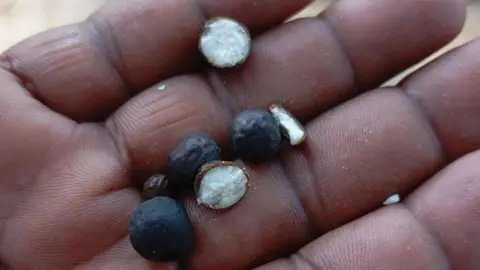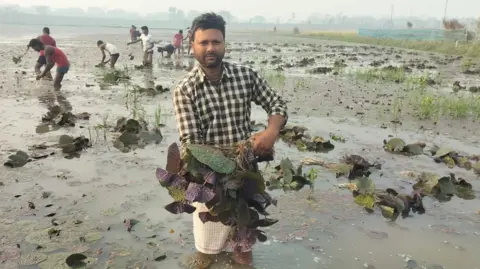 Phool dev Shahni
Phool dev ShahniLike his father and grandfather before him, Phool dev Shahni once made a living by diving to the bottom of 8ft-deep (2.4m), muddy ponds.
“I used to dive in 7 to 8ft of water for hours a day – coming to the surface to breathe after 8 to ten minutes,” explains Mr Shahni.
While down in those murky depths he was harvesting the seeds of a type of water lily called euryale ferox.
Known as makhanas, fox nuts or lotus seeds, they are prized for their nutritional value, being high in B vitamins, protein and fibre, with some touting them as a superfood.
Often eaten as a snack, makhanas are also used in various dishes, including the milk pudding kheer, as well as being ground into flour.
In the north-eastern Indian state of Bihar, where Mr Shahni lives, 90% of the world’s makhana is grown.
The leaves of the lily plant are large and circular and sit on the top of the pond. But the seeds form in pods under water and collecting them was an exhausting process.
“While we are at the bottom diving, mud enters our ears, eyes, nose and mouth. Lots of us have skin issues due to this. Also the plant is covered in thorns, which give us cuts all over our body during harvesting of the seeds,” Mr Shahni says.
But in recent years farmers have changed the cultivation process. The plants are now often grown in fields, in much shallower water.
Harvesting seeds in just a foot of water means Mr Shahni can make twice as much money in a day.
“It’s still hard work but I am proud of my tradition. I have three children and I will make sure that one of my sons continues the legacy of working in a fox nut field.”
 Madhubani Makhana
Madhubani MakhanaDr Manoj Kumar, is one of those behind the change in makhana cultivation.
About ten years ago he realised it would be difficult to expand its cultivation in deep ponds.
Now Senior Scientist at the National Research Centre for Makhana (NRCM), he helped to develop the cultivation of lilies in fields of shallow water.
Over the last four or five years that technique has been taking off.
“With our innovations, growing fox nuts is now as easy as any crop grown on land. The only amount of water needed is a foot. The workers don’t have to work for hours in deep water,” he explains.
And after experiments with different seeds, his centre found a more resilient and productive variety, which he says has tripled the income of farmers.
Dr Kumar says that makhana cultivation has helped some farmers cope with more uncertain weather conditions and floods that have hit Bihar in recent years.
Now NRCM is working on machines that can harvest the seeds.
All that innovation has attracted more and more farmers.
In 2022, the area used for fox nut farming was 35,224 hectares (87,000 acres), an almost threefold increase over 10 years.
 Dhirendra Kumar
Dhirendra KumarDhirendra Kumar is one farmer who has made a recent switch to makhana cultivation.
Although he grew up on a farm, he didn’t want to follow in his father’s footsteps.
“As farmers we always grew wheat, lentils and mustard but ended up losing a lot of money.
“Most of the time floods destroyed the crops,” he says.
While studying for a PhD, he came into contact with a scientist working on makhana cultivation and decided to experiment with the crop on his family farm.
“The results were amazing. In the first year I made a profit of £340 [US$432],” he says.
Now he grows lilies on 17 acres (6.9 hectares) of land.
“In my wildest dreams I did not think that I would get into growing fox nuts, as it was a labour-intensive job, which was mostly carried out by fishermen.”
The change in crop has also opened up job opportunities for women. Mr Kumar now employs about 200 local women who sow the seeds.
“My aim is to provide jobs to as many farmers as possible so they don’t leave farming because of uncertainty in agriculture,” he says.
 Madhubani Makhana
Madhubani MakhanaIt’s not just in the field that innovations have been made.
As well as being one of the leading cultivators of makhana, Madhubani Makhana, processes it for export all over the world.
Traditionally, once the makhanas have been harvested, they are washed, roasted and then hit with a mallet-like tool to make them pop.
“The method is crude, unhygienic and risky. It is laborious, time-consuming and a number of times leads to injuries and burns,” says Shambhu Prasad, the founder and chief executive of Madhubani Makhana.
In partnership with the NRCM, his company has developed a machine which roasts and pops the fox seeds.
“This has helped us increase the quality and the production of fox nuts,” says Mr Prasad.
Three of the machines have been incorporated into his manufacturing plant in Madhubani, in the north of Bihar.
While innovation in the farming and processing of makhana is increasing production, Mr Prasad does not think that will be enough to see prices fall.
“Given the rising global demand for makhana, significant increases in production will be necessary to achieve any substantial reduction in prices,” he says.
Back on his farm, Dhirendra Kumar thinks that makhana cultivation will bring far-reaching change.
“It’s the beginning of innovation in Bihar when it comes to fox nut harvesting. It will change the landscape of the state,” he says.

